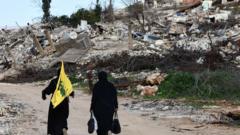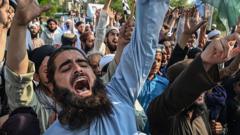Despite challenges, the group retains significant support among its base, though sentiment is shifting as the consequences of conflict become more apparent.
### Hezbollah Faces Uncertain Future Amid Losses and Discontent

### Hezbollah Faces Uncertain Future Amid Losses and Discontent
A recent war has left Hezbollah weakened, grappling with internal dissent and external pressures, raising questions about its future role in Lebanon.
Hezbollah is at a pivotal juncture following a brutal military conflict with Israel that underscored its weakening grip on power and the growing discontent among its supporters. The September 17th detonation of pagers outfitted with explosives marked one of the most devastating moments of the war, killing and injuring scores of civilians—including Adam, a nurse whose harrowing account exemplifies the dire situation on the ground.
Previously, Hezbollah had relied on low-tech pagers to protect its communications from intelligence gathering, unaware that Israel had secretly rigged the devices to explode. Adam, whose injuries left him with limited mobility and eyesight, narrates how the explosion upended his life while revealing a broader narrative of suffering among the group’s supporters.
The consequences of the recent conflict have extended beyond immediate casualties; Hezbollah's stature as an invincible militia has dramatically shifted. Public sentiment is now grappling with the reality of reconstruction costs estimated at $11 billion, as the Lebanese government, under new pressure, has vowed to disarm the group, igniting fears within the community about losing vital support networks that Hezbollah provides.
Walking through the ruins of towns like Kfar Kila, where entire neighborhoods have been erased, it’s evident that support for Hezbollah is still present, albeit mixed with frustration regarding the lack of effective financial assistance. Many, like local shop owner Alia, fear the long-term impacts of Hezbollah’s inability to provide for their basic needs, inciting discussions among some past staunch supporters who are now questioning the group’s military decisions.
The new leadership of Hezbollah, under Naim Qassem following the death of Hassan Nasrallah, is facing scrutiny. As local business owners and former militants share their apprehensions about Hezbollah's military engagements, the group's strategic collaborations with Iranian support have also been hindered by geopolitical shifts, notably the changing dynamics in Syria.
While Hezbollah has historically paralyzed Lebanese governmental processes through its political influence, the aftermath of the war has altered the landscape. A new Lebanese president has promised reforms, a move some perceive as undermining Hezbollah’s long-standing political strategies. It’s a time of reflection for a group once seen as a formidable force.
Continuing to hold on to its identity, Hezbollah's supporters like Adam remain committed to a cause intertwined with their beliefs and daily lives. However, the group must tread carefully to navigate the complexities of internal dissent, reconstruction demands, and external pressures as it contends with the consequences of a war that has severely tested its infrastructure and political dominion.
With the balance of power shifting, Hezbollah's future remains uncertain, as discussions about disarmament loom large alongside voices rising from within its ranks questioning the path forward.
Previously, Hezbollah had relied on low-tech pagers to protect its communications from intelligence gathering, unaware that Israel had secretly rigged the devices to explode. Adam, whose injuries left him with limited mobility and eyesight, narrates how the explosion upended his life while revealing a broader narrative of suffering among the group’s supporters.
The consequences of the recent conflict have extended beyond immediate casualties; Hezbollah's stature as an invincible militia has dramatically shifted. Public sentiment is now grappling with the reality of reconstruction costs estimated at $11 billion, as the Lebanese government, under new pressure, has vowed to disarm the group, igniting fears within the community about losing vital support networks that Hezbollah provides.
Walking through the ruins of towns like Kfar Kila, where entire neighborhoods have been erased, it’s evident that support for Hezbollah is still present, albeit mixed with frustration regarding the lack of effective financial assistance. Many, like local shop owner Alia, fear the long-term impacts of Hezbollah’s inability to provide for their basic needs, inciting discussions among some past staunch supporters who are now questioning the group’s military decisions.
The new leadership of Hezbollah, under Naim Qassem following the death of Hassan Nasrallah, is facing scrutiny. As local business owners and former militants share their apprehensions about Hezbollah's military engagements, the group's strategic collaborations with Iranian support have also been hindered by geopolitical shifts, notably the changing dynamics in Syria.
While Hezbollah has historically paralyzed Lebanese governmental processes through its political influence, the aftermath of the war has altered the landscape. A new Lebanese president has promised reforms, a move some perceive as undermining Hezbollah’s long-standing political strategies. It’s a time of reflection for a group once seen as a formidable force.
Continuing to hold on to its identity, Hezbollah's supporters like Adam remain committed to a cause intertwined with their beliefs and daily lives. However, the group must tread carefully to navigate the complexities of internal dissent, reconstruction demands, and external pressures as it contends with the consequences of a war that has severely tested its infrastructure and political dominion.
With the balance of power shifting, Hezbollah's future remains uncertain, as discussions about disarmament loom large alongside voices rising from within its ranks questioning the path forward.



















